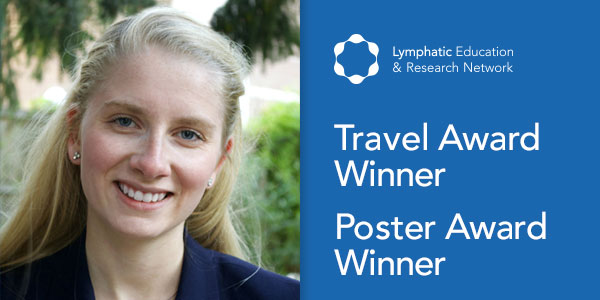Catharine Bowman is an undergraduate student, studying Health Sciences at the University of Calgary in Alberta, Canada. In 2007, Catharine’s mother was diagnosed with secondary lymphedema. From the 10th grade (2014), Catharine has worked in the laboratory of Dr. Pierre Yves von der Weid. At the 2017 Lymphatic Forum in Chicago, Catharine was awarded a Travel Award and Poster Award from LE&RN. We asked Catharine to share her thoughts on this experience with us and to tell us a bit about her research and future plans.
What did you get out of the Forum? Why did you feel it was important to attend?
I have gained an incomparable amount of information pertaining to lymphatics and disease-related research. As an undergraduate student, it is challenging to learn the basics of the lymphatic system and the vital research that is being conducted, due to the minimal coverage currently presented in course and text resources. By attending the Forum, I was able to expand my understanding in both basic knowledge and application-based research. The importance of attending the conference encompasses my belief that scientific research cannot solely be based upon well-established theories, but also involves an integration of creative thinking and collaboration. The conference was an opportunity for researchers to inspire one another to pursue unique directions within their respective projects. Further, it was an educational and networking opportunity for young researchers, like myself, who are establishing their own research directions for the future. The new knowledge gained inspires creative expansion of established theories, leading to the next major discoveries in lymphatic and disease research.
What are your areas of interest in research?
In Grade 10, I established a novel research proposal exploring the influence of particular compounds on specific lymphatic dysfunctions associated with lymphedema. Since then, I have worked with Dr. von der Weid and Dr. Richard C. Austin to explore the influence of the compounds on the inflammation, hyper-permeability of lymphatic vasculature, and smooth muscle contractile dysfunction associated with the development and progression of lymphedema. In 2007, my mother was diagnosed with lymphedema. Since then, I have witnessed her struggle with this condition, recognizing that there is no pharmacological treatment to alleviate her symptoms. Therefore, my long-term goal for this project is to develop pharmacological interventions for lymphedema, utilizing the compounds that I am currently exploring.
What are your hopes and plans for your career and your research?
Upon completion of my undergraduate degree, I hope to continue my studies to complete both MD and PhD degrees, and to serve those suffering from lymphatic diseases. For many years, I have been passionate about my research pursuits; however, when I began to teach and give educational talks to patient groups and caregivers, I realized the importance of frequent patient and care provider interaction ~ there is truly so much to be learned both in the lab and in the clinic! Therefore, I hope to pursue my current research pathway as well as a career as a lymphatic specialist, continuing my advocacy and teaching long-term.
Why do you believe that, in general, lymphatic research is important? What might the field accomplish within the next few years?
In my opinion, the lymphatic system is truly ‘uncharted territory’ in many ways, allowing for vast opportunities for creative exploration in both basic and application-based research. In recent years, research has most definitely showcased the powerful role of this system in regular bodily function as well as in the fascinating interplay between the lymphatics and many of the well-studied systems and current chronic diseases affecting humans. I predict that lymphatic research will become an increasing focus for many researchers in the near future, including those working in neighbouring fields, as I believe hybridizing projects to include lymphatic system influence will reveal many unknown disease-causing factors.
Programs such as LE&RN's Travel Awards program advance the scientific community's understanding of lymphedema and lymphatic diseases, allows for increased communication between researchers, and raises the profile of lymphatic research. These programs are only possible as a result of the generosity and dedication of LE&RN's corporate sponsors and Supporting Members. If you are committed to LE&RN's mission of fighting lymphedema and lymphatic disease through education, research, and advocacy, become a LE&RN Supporting Member today.

